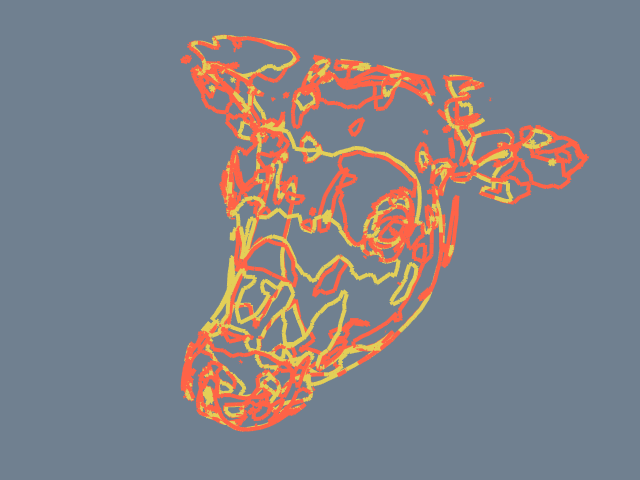ShepardInterpolation
Repository source: ShepardInterpolation
Description¶
Use vtkShepardMethod to interpolate the scalars of a vtkPolyData. The zero-contour of the original and interpoltated scalars are extracted with vtkContourFilter. The original data is shown in red and the interpolated data in shown in yellow.
Usage:
ShepardInterpolation polydata [resolution]
where: - polydata is a polydata file with scalar data. - resolution is the sampling resoluton, default 100.
Question
If you have a question about this example, please use the VTK Discourse Forum
Code¶
ShepardInterpolation.cxx
#include <vtkActor.h>
#include <vtkBYUReader.h>
#include <vtkCamera.h>
#include <vtkContourFilter.h>
#include <vtkImageData.h>
#include <vtkNamedColors.h>
#include <vtkNew.h>
#include <vtkOBJReader.h>
#include <vtkPLYReader.h>
#include <vtkPolyDataMapper.h>
#include <vtkPolyDataReader.h>
#include <vtkProbeFilter.h>
#include <vtkProperty.h>
#include <vtkRenderWindow.h>
#include <vtkRenderWindowInteractor.h>
#include <vtkRenderer.h>
#include <vtkSTLReader.h>
#include <vtkShepardMethod.h>
#include <vtkSmartPointer.h>
#include <vtkSphereSource.h>
#include <vtkXMLPolyDataReader.h>
#include <vtksys/SystemTools.hxx>
#include <iostream>
#include <string>
namespace {
vtkSmartPointer<vtkPolyData> ReadPolyData(const char* fileName);
}
int main(int argc, char* argv[])
{
// Parse input arguments.
if (argc < 2)
{
std::cout
<< "Required parameters: Filename resolution e.g. cowHead.vtp 100"
<< std::endl;
return EXIT_FAILURE;
}
vtkNew<vtkNamedColors> colors;
auto polyData = ReadPolyData(argv[1]);
unsigned int resolution = 100;
if (argc > 2)
{
resolution = std::atoi(argv[2]);
}
vtkNew<vtkShepardMethod> interpolator;
interpolator->SetInputData(polyData);
interpolator->SetModelBounds(polyData->GetBounds());
interpolator->SetSampleDimensions(resolution, resolution, resolution);
interpolator->SetNullValue(-10000);
interpolator->Update();
std::cout << "Scalar Range: "
<< interpolator->GetOutput()->GetScalarRange()[0] << ", "
<< interpolator->GetOutput()->GetScalarRange()[1] << std::endl;
vtkNew<vtkProbeFilter> probe;
probe->SetInputData(0, polyData);
probe->SetInputConnection(1, interpolator->GetOutputPort());
vtkNew<vtkContourFilter> interpolatedContour;
interpolatedContour->SetInputConnection(probe->GetOutputPort());
interpolatedContour->SetValue(0, 0.0);
vtkNew<vtkContourFilter> originalContour;
originalContour->SetInputData(polyData);
originalContour->SetValue(0, 0.0);
vtkNew<vtkPolyDataMapper> interpolatedMapper;
interpolatedMapper->SetInputConnection(interpolatedContour->GetOutputPort());
interpolatedMapper->ScalarVisibilityOff();
vtkNew<vtkActor> interpolatedActor;
interpolatedActor->SetMapper(interpolatedMapper);
interpolatedActor->GetProperty()->SetColor(
colors->GetColor3d("Banana").GetData());
interpolatedActor->GetProperty()->SetLineWidth(4.0);
vtkNew<vtkPolyDataMapper> originalMapper;
originalMapper->SetInputConnection(originalContour->GetOutputPort());
originalMapper->ScalarVisibilityOff();
vtkNew<vtkActor> originalActor;
originalActor->SetMapper(originalMapper);
originalActor->GetProperty()->SetColor(
colors->GetColor3d("Tomato").GetData());
originalActor->GetProperty()->SetLineWidth(4.0);
vtkNew<vtkRenderer> renderer;
vtkNew<vtkRenderWindow> renderWindow;
renderWindow->AddRenderer(renderer);
renderWindow->SetWindowName("ShepardInterpolation");
vtkNew<vtkRenderWindowInteractor> renderWindowInteractor;
renderWindowInteractor->SetRenderWindow(renderWindow);
renderer->AddActor(interpolatedActor);
renderer->AddActor(originalActor);
renderer->SetBackground(colors->GetColor3d("SlateGray").GetData());
renderer->ResetCamera();
renderer->GetActiveCamera()->Azimuth(120);
renderer->GetActiveCamera()->Elevation(30);
renderer->GetActiveCamera()->Dolly(1.5);
renderer->ResetCameraClippingRange();
renderWindow->SetSize(640, 480);
renderWindow->Render();
renderWindowInteractor->Start();
return EXIT_SUCCESS;
}
namespace {
vtkSmartPointer<vtkPolyData> ReadPolyData(const char* fileName)
{
vtkSmartPointer<vtkPolyData> polyData;
std::string extension =
vtksys::SystemTools::GetFilenameExtension(std::string(fileName));
if (extension == ".ply")
{
vtkNew<vtkPLYReader> reader;
reader->SetFileName(fileName);
reader->Update();
polyData = reader->GetOutput();
}
else if (extension == ".vtp")
{
vtkNew<vtkXMLPolyDataReader> reader;
reader->SetFileName(fileName);
reader->Update();
polyData = reader->GetOutput();
}
else if (extension == ".obj")
{
vtkNew<vtkOBJReader> reader;
reader->SetFileName(fileName);
reader->Update();
polyData = reader->GetOutput();
}
else if (extension == ".stl")
{
vtkNew<vtkSTLReader> reader;
reader->SetFileName(fileName);
reader->Update();
polyData = reader->GetOutput();
}
else if (extension == ".vtk")
{
vtkNew<vtkPolyDataReader> reader;
reader->SetFileName(fileName);
reader->Update();
polyData = reader->GetOutput();
}
else if (extension == ".g")
{
vtkNew<vtkBYUReader> reader;
reader->SetGeometryFileName(fileName);
reader->Update();
polyData = reader->GetOutput();
}
else
{
vtkNew<vtkSphereSource> source;
source->Update();
polyData = source->GetOutput();
}
return polyData;
}
} // namespace
CMakeLists.txt¶
cmake_minimum_required(VERSION 3.12 FATAL_ERROR)
project(ShepardInterpolation)
find_package(VTK COMPONENTS
CommonColor
CommonCore
CommonDataModel
FiltersCore
FiltersSources
IOGeometry
IOLegacy
IOPLY
IOXML
ImagingHybrid
InteractionStyle
RenderingContextOpenGL2
RenderingCore
RenderingFreeType
RenderingGL2PSOpenGL2
RenderingOpenGL2
)
if (NOT VTK_FOUND)
message(FATAL_ERROR "ShepardInterpolation: Unable to find the VTK build folder.")
endif()
# Prevent a "command line is too long" failure in Windows.
set(CMAKE_NINJA_FORCE_RESPONSE_FILE "ON" CACHE BOOL "Force Ninja to use response files.")
add_executable(ShepardInterpolation MACOSX_BUNDLE ShepardInterpolation.cxx )
target_link_libraries(ShepardInterpolation PRIVATE ${VTK_LIBRARIES}
)
# vtk_module_autoinit is needed
vtk_module_autoinit(
TARGETS ShepardInterpolation
MODULES ${VTK_LIBRARIES}
)
Download and Build ShepardInterpolation¶
Click here to download ShepardInterpolation and its CMakeLists.txt file. Once the tarball ShepardInterpolation.tar has been downloaded and extracted,
cd ShepardInterpolation/build
If VTK is installed:
cmake ..
If VTK is not installed but compiled on your system, you will need to specify the path to your VTK build:
cmake -DVTK_DIR:PATH=/home/me/vtk_build ..
Build the project:
make
and run it:
./ShepardInterpolation
WINDOWS USERS
Be sure to add the VTK bin directory to your path. This will resolve the VTK dll's at run time.
